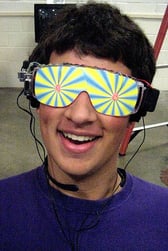NPR’s Fresh Air featured an article and interview with neuroscientist Dr. Frances Jensen a while back entitled “Why Teens Are Impulsive, Addiction- Prone And Should Protect Their Brains”. Within this discussion, we learn that while the frontal lobe brain structures in teens are “built”, they are far from fully-formed. These structures are the parts of the brain that control executive function skills such as decision-making, organization, planning, prioritizing, and self-regulation, to name a few of the key functions. The NPR article considers the impact of electronic media on teenagers and why it matters.
Prone And Should Protect Their Brains”. Within this discussion, we learn that while the frontal lobe brain structures in teens are “built”, they are far from fully-formed. These structures are the parts of the brain that control executive function skills such as decision-making, organization, planning, prioritizing, and self-regulation, to name a few of the key functions. The NPR article considers the impact of electronic media on teenagers and why it matters.
Teen Brains: A Work in Progress
Each neuron in the brain is coated in a fatty substance called myelin, which allows for faster and more complete messages to be sent and received by individual neurons. Think of myelin as insulation on electrical wires; with poor insulation, energy is lost. Decisions can take nanoseconds, so the speed at which your brain can give you the best information is actually very important. Myelin is built up over time and the more you use those complex problem solving abilities in your frontal lobes, the more myelin coating you develop. Research shows a wide variability for when myelin has successfully reached to the very front parts of the brain (from your early 20’s to possibly mid 30’s).
Knowing that the most complex part of their brains are works in progress, it’s clear that the teenage brain is not like an adult brain. Teenagers do not have the built up experience or myelin to be able to stop impulsive decisions, particularly with regard to electronic media. We live in a time like no other, where electronic distractions are at our fingertips. And teens are particularly vulnerable to the siren song of instant gratification through the click of a mouse or a touch of a screen.
The Lure of Electronic Media on Teens
How does this impact a middle school or high school student? With 8 hour school days, 1-4 hours of homework, after-school activities, family dinner, college prep, hanging with friends, when exactly do teens have the time for something our culture deems very valuable and almost a daily necessity? (Did you watch the latest Lip Sync Battle? Which Spongebob character are you? What will happen on the new season of Game of Thrones? Did you see the Madonna and Drake video?) There’s a force underlying our culture that says we must be on top of all these social stories. Personally, I have found myself drawing away from the constant updates from friends and family, but I still want to know what George Takei has to say. This is our culture, like it or not.
In Executive Function coaching, we support many students with how to best balance their competing commitments, such as doing their homework versus checking Facebook or Instagram. Social networking is an integral part of our lives and we are not going to make any headway banning such an important social outlet, nor would it be particularly healthy. We can even say the same for our adult selves! However, knowing the importance of prioritizing and making sound decisions about our actions influences how adults use these outlets.
Knowledge versus Rules
We need to inform teens about the way their brain is developing. We need to arm our students with knowledge rather than enforcing rules that seem to only encourage more rebellion. No video games during the week? Fine. I’ll just stay up late and play when you’re asleep! Teens aren’t thinking about how a lack of sleep will reduce their memory function, lower their immune system, and make it much more challenging to self-regulate the next day and beyond. Teenagers are not aware of how artificial lighting and visual stimuli actually keep the brain awake, but make you pay one way or another.
Knowledge is power. As adults, we tend to enjoy learning about our brains, but I know for a fact that students are every bit as interested, yet rarely are given the information or time to think about the way their brain is developing and the choices they have to support or not support themselves. Students need to know the cost of their actions, not just a: “you really shouldn’t do that”. They need to learn how to make informed decisions. They need to know what the price of a choice might be and to be given the room to decide if they are willing to pay that price or not. We need to model that for students by starting with the way an adult might consciously weigh the price of staying up late to finish a great book, or putting it aside to get some extra sleep for a busy upcoming day. Taking the time to pass along an article about the teen brain (see below) or share a video is one great way to start this important conversation.
Is your teen distracted by technology and spending hours on homework as a result? Click below to download our guide to "Cutting Your Homework Time in Half!"
Resources for Parents to Start the Teenage Brain Development Conversation
The Teen Brain (NPR): http://www.npr.org/templates/story/story.php?storyId=124119468
Adolescent Maturity and the Brain (NIH): http://www.ncbi.nlm.nih.gov/pmc/articles/PMC2892678/
Brilliant, Brazen, Teenage Brains (Psychology Today): https://www.psychologytoday.com/blog/trouble-in-mind/201112/brilliant-brazen-teenage-brains
The Mysterious Workings of the Adolescent Brain (TED talk): http://www.ted.com/talks/sarah_jayne_blakemore_the_mysterious_workings_of_the_adolescent_brain?language=en

Annabel Furber is a Senior Level Executive Function coach and Supervisor with Beyond BookSmart. She also works as a college instructor and has a background in special education, psychology and neuroscience. She has experience in both educational practices and educational research. Annabel earned a Master’s degree in the field of Mind, Brain, and Education from Harvard Graduate School of Education. Annabel believes in Neurodiversity—that each mind is as unique as a thumb print and no single approach to teaching is useful for all—and that learning challenges often accompany unique skills and talents that require an understanding of the impact of context, motivation, and personal goals. In addition to Executive Function coaching and supervising other coaches, Annabel conducts research and development for Beyond BookSmart. Annabel also serves as an instructor for CAST (Center for Applied Special Technologies) through the Mass Focus program, a graduate course aimed to instruct teachers on how to Universally Design for Learning (UDL).
photo credit: IMG_1236 via photopin (license)

